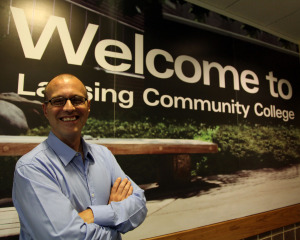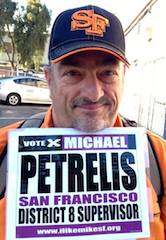 |
| Todd Heywood |
 |
| Michael Petrelis |
As the nation prepares for Tuesday’s midterms, some voters will have the chance to elect openly HIV-positive candidates. Among those political hopefuls are Todd Heywood and Michael Petrelis.
Heywood is the first HIV-positive candidate running for office in Michigan. Petrelis, a longtime HIV-positive advocate, is running for a seat on the San Francisco Board of Supervisors. If elected, they would join John D’Amico, the HIV-positive mayor of West Hollywood, and Corey Johnson of the New York City Council, as some of the very few political leaders living openly with the virus.
Of course, there have been openly HIV-positive candidates and elected officials before. In 1990, Sean Strub became one of the first. He says he ran for a seat in the 22nd Congressional District in New York State out of frustration more than anything.
Strub had been arrested engaging in countless HIV/AIDS demos, and he fundraised for ACT UP New York. Then, suddenly, he was presented with the opportunity to run for Congress, a chance the young, outspoken activist decided he couldn’t pass up.
“I always knew it was a long-shot race, but I also knew there would be value in it,” Strub recalls. In many ways, the election was a way to address fears and stigmas around the epidemic head-on. Although the race was competitive, he was not elected.
“In 1990, people were interested in AIDS; it was a huge issue in society,” says Strub, who founded POZ in 1994 and now leads the Sero Project, an HIV advocacy group. “Today, many have turned off or turned away from the issue, so it is tougher to get it discussed in the public and political realm.”
Despite widespread disinterest in HIV/AIDS, Michael Petrelis is trying his hardest to make sure issues related to the virus, as well as LGBT issues, don’t get lost in the political ether.
Like Strub, Petrelis is running in protest. “In the past few years, there have been too many races [in San Francisco] where there was only one candidate. There were no serious challengers to incumbents.”
The former ACT UP member describes himself as the “underdog” in the District 8 race. He’s running against incumbent Scott Wiener, who has served as the district supervisor for the past four years.
Weiner recently revealed that, as an HIV-negative gay man, he was taking pre-exposure prophylaxis (PrEP) for HIV prevention, which makes the race all the more interesting.
“I say I’ve already ‘won’ in the sense that, for the past 10 or 11 months, I have engaged with voters as a person living with AIDS,” Petrelis says. “I’ve engaged with many other HIV-positive people in San Francisco and a number of people who are HIV negative and certainly concerned about AIDS. It’s really been a fulfilling endeavor.”
Todd Heywood is running against six other candidates for two open seats on the Lansing Community College board of trustees in Lansing, Michigan.
Unlike Strub or Petrelis, Heywood isn’t running as a protest candidate. As a graduate of the college, he says his focus on HIV/AIDS and LGBT issues have made him more qualified for the job.
“I don’t have a lot of money to give to the community,” says Heywood, a reporter whose work has been cited by the United Nations Global Commission Report on HIV and the Law, as well as U.S. Representative Barbara Lee (D–Calif.). “But I have time, and I have skills, and I have understanding of policy. That’s my way to give back to the community.”
This isn’t Heywood’s first stint in politics, either. From 2001 to 2003, he sat as an interim trustee on the college’s board. “At that point, I was actually the first openly gay man to serve on a community college board of trustees in the state of Michigan,” he says.
Heywood says that his HIV-positive status has not been a major factor in this election. Instead, his financial know-how, community support and other qualifications have reigned supreme.
“I understand the struggles that our students are having, making the decision between buying meds or paying for groceries or paying the water bill or paying the electric bill,” he says. “I understand that checkbook-balancing game that has to happen. For some who are in the board room, that’s a distant memory.”
Being HIV positive also wasn’t a major factor in Strub’s race for Congress in the ’90s. “I didn’t usually bring it up in my speeches and talks,” he says.
“Having HIV isn’t a qualification for office, but by running for office—and getting elected—we’ll prove it isn’t a disqualification.”
For Petrelis, being HIV positive is an asset in his race for supervisor.
“One benefit, if I were to be elected, would be that I know how to follow the money through the AIDS groups,” he says. He has a long record of pushing AIDS service organizations to release their federal tax returns to increase financial transparency.
“We’ve been throwing so many millions of dollars at AIDS in San Francisco, but I don’t think we’ve asked the question: Has the money been effectively used?”
In addition to delivering on policy goals that support people living with the virus, Heywood, Petrelis and Strub believe that getting the HIV/AIDS community involved in politics also helps combat stigma and discrimination.
“In many places, we need people to run as HIV-positive candidates to bring up issues such as following public HIV money, prevention and treatment,” Petrelis says. “[But] politics is more than Election Day. Political engagement is year-round. HIV-positive people should register to vote, and then ask candidates about AIDS issues."
“Being open about it sends the message that HIV is not what it used to be and we can talk about it,” adds Heywood. “There’s some real positives to standing up and saying, ‘Yeah, I’m living with this disease; so what? I’m still a contributing member of society.’
“Government and politics are not just the big races that we see: the senate, the house, the city council,” he continues. “It’s all kinds of little subdivisions, so find your passion and you can find your way to participate.”
Strub takes that idea further by encouraging individuals living with the virus to join national networks of HIV-positive people. They include the Positive Women’s Network, the Global Network of People Living with HIV, the International Community of Women with HIV and the Sero Project. All these groups are working to influence politics at a more grassroots, community-based level.
“Whether it is a local monthly potluck supper group of people with HIV, one of emerging long-term survivor groups, or the client advisory board at the agency where you get services, the key thing is to start by working with other people with HIV and our closest allies,” Strub says.
Whatever your politics, remember to vote.
Editor’s Note: Neither Haywood nor Petrelis won their races, but we congratulate them for their efforts.







1 Comment
1 Comment